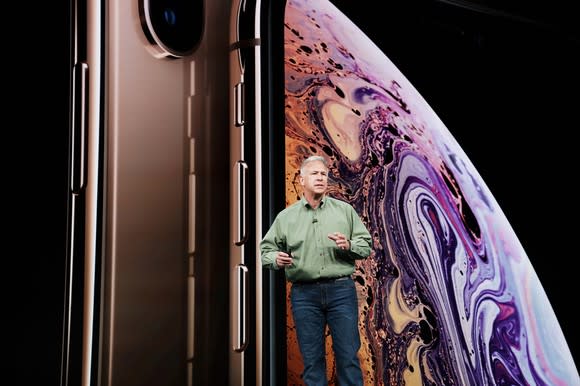Apple's iPhone XS Max Teardown Reveals Further Vertical Integration
Apple (NASDAQ: AAPL) has a long history of bringing the development of critical technologies in-house. Perhaps the highest-profile example of that would be the company's A-series applications processors. Apple has been designing its own applications processors for years but has, over time, swapped out licensed pieces of intellectual properties within those chips for Apple-designed ones.
For years, Apple has sourced power management integrated circuits (PMICs) from a small company called Dialog Semiconductor (NASDAQOTH: DLGNF). That business relationship has been hugely important to Dialog Semiconductor. In fact, in its most recent annual report, the company reported that revenue from Apple was $1.043 billion, or about 77% of its sales in the year.

Apple marketing chief Phil Schiller. Image source: Apple.
Back in May, Dialog admitted to investors that it had been "provided with a reduced share of the volume forecast from Apple for the main Power Management IC (PMIC) for the 2018 smartphone platform." The impact of that share loss, Dialog said at the time, was "estimated to reduce the FY 2018 revenue by approximately 5%."
Per a recent teardown report from TechInsights, the iPhone XS Max -- at the very least, the particular handset that TechInsights tore down -- features an Apple-designed main PMIC. On Dialog's Aug. 2 earnings call, CEO Jalal Bagherli told investors that Dialog has "two chips in the upcoming cycle, one is across all three [iPhones] and one is across two models."
So, TechInsights' stated expectation that a teardown of the standard-sized iPhone XS will reveal a Dialog-designed main PMIC is reasonable.
In light of this, it's worth reviewing what else Dialog management had to say about its relationship with Apple on its Aug. 2 earnings conference call.
About the 2019 models
As far as Apple's 2019 iPhones go, Bagherli said on Aug. 2 that Dialog has "completed our design, we've sampled the chip, and the chip is being evaluated by the customer."
"But in terms of volume or how many models, etc., that is still not determined and we will update you when that is the case," Bagherli clarified.
Looking out longer-term
Although Bagherli admits that the "main core PMIC is now dual-sourced and we lost a share of volume this year" and that this phenomenon "is expected to continue going forward," the executive talked up its relationship with Apple.
For example, he claimed that since May, Dialog "won [an] additional three other designs" that were "across different platforms."
He also said that "the good thing is the number of opportunities coming our way has not diminished" and that "in fact, if anything, is increasing in terms of numbers of opportunities."
"And the relationship is very healthy," Bagherli asserted.
Don't get too comfortable
Although I wouldn't be surprised if Apple continues to source PMICs and sub-PMICs from Dialog for the foreseeable future across a range of product lines (particularly in product lines that aren't as critical to Apple's business as the iPhone), I don't think it's prudent to dismiss the risk that Dialog will eventually lose the rest of the main PMIC revenue that it generates from the iPhone over time.
Indeed, it doesn't surprise me that from a risk-management perspective, Apple would limit using its first internally designed main PMIC (or, at least, the first one that was good enough to ship in a commercially available product) to a single model. However, as Apple's internal PMIC design teams gain experience and confidence, it doesn't seem too crazy to think that, over time, it'll proliferate its internally developed main PMICs across a broader swath of its iPhone lineup.
Dialog may have other opportunities lined up at Apple, but it's hard to get too excited about those when there could be further pain ahead for the chip company on the iPhone main PMIC front.
More From The Motley Fool
Ashraf Eassa has no position in any of the stocks mentioned. The Motley Fool owns shares of and recommends Apple. The Motley Fool has the following options: long January 2020 $150 calls on Apple and short January 2020 $155 calls on Apple. The Motley Fool has a disclosure policy.
